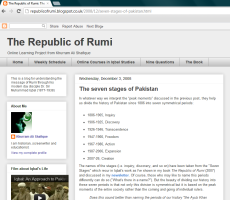Saleena Karim's Blog, page 6
August 30, 2012
René Raison – rebirth of reason
Note: I accidentally titled this ‘Rebirth of Thought’ when it should have said ‘Reason (for) Rebirth’. Corrected now. I’m half asleep today!
Note (again): It was really bugging me why I had thought ‘raison’ meant thought, so I double-checked. Turns out that when I originally chose the word ‘raison’ (some years go), I picked it for its second meaning: reason, mind. So my memory wasn’t mixed up after all. Note to self: Never second-guess yourself during a migraine!
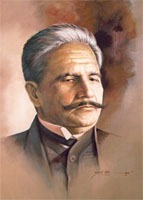
Dr Muhammad Iqbal – Courtesy allamaiqbal.com
I intended to put up an entirely different post today, but will leave that for later (though that one is important too). Just wanted to mention something that has come up at the Marghdeen Learning Centre’s present course, The Wisdom of Moses, where Systems also happens to be part of its required reading list.
This week’s question was asking about what is common between two seemingly unrelated passages written by Iqbal. They are quite long so I won’t reproduce them in full here, but in short both of them mention the passage in the Quran in which there is a reference to ‘resurrection’ or ‘rebirth’.
As Iqbal quotes it:
Your creation and resurrection are like the creation and resurrection of a single soul. (31:28)
Aside from a few who believe that this is literally a reference to reincarnation on earth (and yes, I used reincarnation as a metaphor in Systems), most understand that this is a comment on the recycling of the universe (including life), and it is also a statement on the birth and rebirth of humanity as a whole, treated as a ‘single soul’. In addition, it’s saying that the fate of human society rests equally on each and every one of us. So each of us is also society (or humanity), and what every one of us does will affect its evolution.
But there is a bit more to it than even that – from Iqbal’s viewpoint. He was interested in the method for reviving society. His comments from the two aforementioned passages are as follows:
First passage: Allahabad Address: Is it possible for you to achieve the organic wholeness of a unified will? Yes, it is. … Pass from matter to spirit. Matter is diversity; spirit is light, life and unity. … One of the profoundest verses in the Holy Quran teaches us that the birth and rebirth of the whole of humanity is like the birth and rebirth of a single individual. Why cannot you … as a people, … live and move and have your being as a single individual?
Second passage: The Reconstruction of Religious Thought in Islam: A living experience of the kind of biological unity, embodied in this verse [as cited above], requires today a method physiologically less violent and psychologically more suitable to a concrete type of mind.
Now this has caused a stir over at the course. What is biological unity? What is ‘rebirth’? How do we achieve it? What does Iqbal mean when he says about society: live and move and have your being as a single individual?
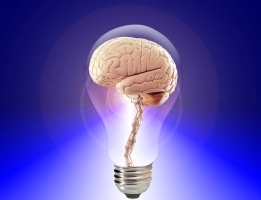
Brain, mind – Two-in-one
The question becomes easier to answer if it is reworded: How do we reboot the mind (of society)? Obviously, through re-education, or, in biological terms, by rewiring the brain. We know how difficult it is in science to differentiate between brain and mind anyway. (Now you also know why reincarnation and psychic ability – what Hitoshi called a ‘worldwide neuron network’ – appear together in Systems.) If a society can achieve this, it will also achieve unity of collective thought – and unity of purpose. This is what the theorem (and the Systems Experiment) in the novel highlights as well (Chapter 11). Oh, and it was something I mentioned a few times in SJ2 as well, though there it was phrased ‘intellectual unity’. 
In other words, this is all theorem stuff again. My favourite Iqbal line, the one I call the ‘muse’ for the theorem, speaks of rendering the three intangible ideals (equality, freedom, solidarity) as ‘space-time forces’:
Muse line (Reconstruction): The essence of ‘Tauhid’ [Unity of God] as a working idea is equality, solidarity, and freedom. The State … is an endeavour to transform these ideal principles into space-time forces, an aspiration to realise them in a definite human organisation.
As far as I understand it, there is scant difference between this passage about the ‘state’ and the ones about ‘biological’ unity. Both are describing the meaning of true Unity. It’s just the subject that differs. One is the human being; the other the political state. In fact, the muse line technically mentions both ‘state’ and the human being (‘human organisation’).
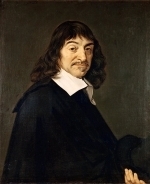
René Descartes
Incidentally – more trivia for you – a key location (and a chapter) in Systems was quite deliberately named René Raison dam. It was a wink and a nod to René Descartes, the father of the dualist doctrine, as well as a phrase in French – ignoring the bad grammar.  Literal meaning is in the title of this article, and its implication is that we need to rethink what reality means. Is it split into spirit and matter, unseen and seen, thought and material, body and mind, space and time?
Literal meaning is in the title of this article, and its implication is that we need to rethink what reality means. Is it split into spirit and matter, unseen and seen, thought and material, body and mind, space and time?
Or is it Unified?
René Raison – Rebirth of Reason
Note: I accidentally titled this ‘Rebirth of Thought’ when it should have said ‘Reason (for) Rebirth’. Corrected now. I’m half asleep today!
Note (again): It was really bugging me why I had thought ‘raison’ meant thought, so I double-checked. Turns out that when I originally chose the word ‘raison’ (some years go), I picked it for its second meaning: reason, mind. So my memory wasn’t mixed up after all. Note to self: Never second-guess yourself during a migraine!

Dr Muhammad Iqbal - Courtesy allamaiqbal.com
I intended to put up an entirely different post today, but will leave that for later (though that one is important too). Just wanted to mention something that has come up at the Marghdeen Learning Centre’s present course, The Wisdom of Moses, where Systems also happens to be part of its required reading list.
This week’s question was asking about what is common between two seemingly unrelated passages written by Iqbal. They are quite long so I won’t reproduce them in full here, but in short both of them mention the passage in the Quran in which there is a reference to ‘resurrection’ or ‘rebirth’.
As Iqbal quotes it:
Your creation and resurrection are like the creation and resurrection of a single soul. (31:28)
Aside from a few who believe that this is literally a reference to reincarnation on earth (and yes, I used reincarnation as a metaphor in Systems), most understand that this is a comment on the recycling of the universe (including life), and it is also a statement on the birth and rebirth of humanity as a whole, treated as a ‘single soul’. In addition, it’s saying that the fate of human society rests equally on each and every one of us. So each of us is also society (or humanity), and what every one of us does will affect its evolution.
But there is a bit more to it than even that – from Iqbal’s viewpoint. He was interested in the method for reviving society. His comments from the two aforementioned passages are as follows:
First passage: Allahabad Address: Is it possible for you to achieve the organic wholeness of a unified will? Yes, it is. … Pass from matter to spirit. Matter is diversity; spirit is light, life and unity. … One of the profoundest verses in the Holy Quran teaches us that the birth and rebirth of the whole of humanity is like the birth and rebirth of a single individual. Why cannot you … as a people, … live and move and have your being as a single individual?
Second passage: The Reconstruction of Religious Thought in Islam: A living experience of the kind of biological unity, embodied in this verse [as cited above], requires today a method physiologically less violent and psychologically more suitable to a concrete type of mind.
Now this has caused a stir over at the course. What is biological unity? What is ‘rebirth’? How do we achieve it? What does Iqbal mean when he says about society: live and move and have your being as a single individual?

Brain, mind - Two-in-one
The question becomes easier to answer if it is reworded: How do we reboot the mind (of society)? Obviously, through re-education, or, in biological terms, by rewiring the brain. We know how difficult it is in science to differentiate between brain and mind anyway. (Now you also know why reincarnation and psychic ability – what Hitoshi called a ‘worldwide neuron network’ – appear together in Systems.) If a society can achieve this, it will also achieve unity of collective thought – and unity of purpose. This is what the theorem (and the Systems Experiment) in the novel highlights as well (Chapter 11). Oh, and it was something I mentioned a few times in SJ2 as well, though there it was phrased ‘intellectual unity’. 
In other words, this is all theorem stuff again. My favourite Iqbal line, the one I call the ‘muse’ for the theorem, speaks of rendering the three intangible ideals (equality, freedom, solidarity) as ‘space-time forces’:
Muse line (Reconstruction): The essence of ‘Tauhid’ [Unity of God] as a working idea is equality, solidarity, and freedom. The State … is an endeavour to transform these ideal principles into space-time forces, an aspiration to realise them in a definite human organisation.
As far as I understand it, there is scant difference between this passage about the ‘state’ and the ones about ‘biological’ unity. Both are describing the meaning of true Unity. It’s just the subject that differs. One is the human being; the other the political state. In fact, the muse line technically mentions both ‘state’ and the human being (‘human organisation’).

René Descartes
Incidentally – more trivia for you – a key location (and a chapter) in Systems was quite deliberately named René Raison dam. It was a wink and a nod to René Descartes, the father of the dualist doctrine, as well as a phrase in French – ignoring the bad grammar.  Literal meaning is in the title of this article, and its implication is that we need to rethink what reality means. Is it split into spirit and matter, unseen and seen, thought and material, body and mind, space and time?
Literal meaning is in the title of this article, and its implication is that we need to rethink what reality means. Is it split into spirit and matter, unseen and seen, thought and material, body and mind, space and time?
Or is it Unified?
René Raison – Reason for Rebirth
Note: I accidentally titled this ‘Rebirth of Reason’ when it should have said ‘Reason (for) Rebirth’. Corrected now. I’m half asleep today!

Dr Muhammad Iqbal - Courtesy allamaiqbal.com
I intended to put up an entirely different post today, but will leave that for later (though that one is important too). Just wanted to mention something that has come up at the Marghdeen Learning Centre’s present course, The Wisdom of Moses, where Systems also happens to be part of its required reading list.
This week’s question was asking about what is common between two seemingly unrelated passages written by Iqbal. They are quite long so I won’t reproduce them in full here, but in short both of them mention the passage in the Quran in which there is a reference to ‘resurrection’ or ‘rebirth’.
As Iqbal quotes it:
Your creation and resurrection are like the creation and resurrection of a single soul. (31:28)
Aside from a few who believe that this is literally a reference to reincarnation on earth (and yes, I used reincarnation as a metaphor in Systems), most understand that this is a comment on the recycling of the universe (including life), and it is also a statement on the birth and rebirth of humanity as a whole, treated as a ‘single soul’. In addition, it’s saying that the fate of human society rests equally on each and every one of us. So each of us is also society (or humanity), and what every one of us does will affect its evolution.
But there is a bit more to it than even that – from Iqbal’s viewpoint. He was interested in the method for reviving society. His comments from the two aforementioned passages are as follows:
First passage: Allahabad Address: Is it possible for you to achieve the organic wholeness of a unified will? Yes, it is. … Pass from matter to spirit. Matter is diversity; spirit is light, life and unity. … One of the profoundest verses in the Holy Quran teaches us that the birth and rebirth of the whole of humanity is like the birth and rebirth of a single individual. Why cannot you … as a people, … live and move and have your being as a single individual?
Second passage: The Reconstruction of Religious Thought in Islam: A living experience of the kind of biological unity, embodied in this verse [as cited above], requires today a method physiologically less violent and psychologically more suitable to a concrete type of mind.
Now this has caused a stir over at the course. What is biological unity? What is ‘rebirth’? How do we achieve it? What does Iqbal mean when he says about society: live and move and have your being as a single individual?

Brain, mind - Two-in-one
The question becomes easier to answer if it is reworded: How do we reboot the mind (of society)? Obviously, through re-education, or, in biological terms, by rewiring the brain. We know how difficult it is in science to differentiate between brain and mind anyway. (Now you also know why reincarnation and psychic ability – what Hitoshi called a ‘worldwide neuron network’ – appear together in Systems.) If a society can achieve this, it will also achieve unity of collective thought – and unity of purpose. This is what the theorem (and the Systems Experiment) in the novel highlights as well (Chapter 11). Oh, and it was something I mentioned a few times in SJ2 as well, though there it was phrased ‘intellectual unity’. 
In other words, this is all theorem stuff again. My favourite Iqbal line, the one I call the ‘muse’ for the theorem, speaks of rendering the three intangible ideals (equality, freedom, solidarity) as ‘space-time forces’:
Muse line (Reconstruction): The essence of ‘Tauhid’ [Unity of God] as a working idea is equality, solidarity, and freedom. The State … is an endeavour to transform these ideal principles into space-time forces, an aspiration to realise them in a definite human organisation.
As far as I understand it, there is scant difference between this passage about the ‘state’ and the ones about ‘biological’ unity. Both are describing the meaning of true Unity. It’s just the subject that differs. One is the human being; the other the political state. In fact, the muse line technically mentions both ‘state’ and the human being (‘human organisation’).

René Descartes
Incidentally – more trivia for you – a key location (and a chapter) in Systems was quite deliberately named René Raison dam. It was a wink and a nod to René Descartes, the father of the dualist doctrine, as well as a phrase in French – ignoring the bad grammar.  Literal meaning is in the title of this article, and its implication is that we need to rethink what reality means. Is it split into spirit and matter, unseen and seen, thought and material, body and mind, space and time?
Literal meaning is in the title of this article, and its implication is that we need to rethink what reality means. Is it split into spirit and matter, unseen and seen, thought and material, body and mind, space and time?
Or is it Unified?
August 26, 2012
Systems in a Terminator Spoof
Apparently, humans are not the only readers of my novel. In this short spoof, the Terminator (or rather, the Procrastinator) has a habit of putting things off with meaningless tasks. He also has interesting reading habits. 
This short film, titled The Procrastinator, was in fact created by my brother Shahid Karim, and it has just been submitted to a local film festival (bang! film festival in Nottingham). You’ve seen his work before: He created the trailers for both Systems and SJ2.
(And yes, this really is my third post in as many days. A record from me, and not likely to be repeated any time soon. Just had a lot of news.  )
)
August 25, 2012
Launch Series Guest Post at the Visionary Fiction Alliance
The Visionary Fiction Alliance website is presently running a series of posts to celebrate its launch, written by its founding members. Today is my turn. The article is titled: Visionary: Fiction of the Future, a slightly edited version of a guest post that I originally wrote for the VF web-ring. Head on over and say hello.
August 24, 2012
Five Things You Don’t Know About Systems
*********************
Trivia time: Here are five things you didn’t know about the novel and its characters.
Warning: May contain spoilers!
*********************
1) The Original Conspiracy: Read the copyright notice at the beginning of the novel for a hidden message.
2) Names: The names of most key characters in the novel carry significant meanings (Aaron, Adam, David, Omar, Kingswell, Kash, Peter). But the names Elise and Hitoshi are special because their respective meanings were not known to me when I chose them. They are a neat case of synchronicity.

Elise Archer - heroine
Elise is a modern form of the Hebrew name Elisheva, meaning ‘My God is an Oath’. This has implications for the Cohesive Ethics theorem (which I won’t explain here); it connects directly to ‘Leon’s promise’ in the novel; and Elisheva also happens to be the wife of the Prophet Aaron in the Bible. Hitoshi means ‘equal’, ‘even-tempered’ or ‘simultaneous’ depending on the spelling. This makes perfect sense when you know what Hitoshi’s problem is!
3) Three ideals: Peter, Hitoshi and Aaron represent the three separated ideals of justice, liberty and unity respectively. Elise represents humanity encountering these three ideals in their ‘separated’ form, i.e. the limited way that we view them.

The Triumvirate Committee - also known as E3
4) Three evils: The evil organisation E3 is described in the novel as being made up of three divisions: Political, economic and religious. These three divisions are taken from the three symbols of tyranny listed in the Quran: Pharaoh, the representative of political tyranny; Qaroon, a wealthy magnate representing economic tyranny; and Hamaan, the high priest of the temple of Ammon who represents religious tyranny. All three of these figures were contemporaries, and they also represent the mirror opposites of the Cohesive Ethics ideals: oppression, injustice and disunity respectively.
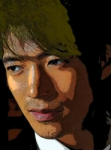
Hitoshi Katayama - friend or foe?
5) The song and its writer: The song My Fate which appears in the novel originally had different lyrics. It was recorded under the title Ablaze, but I was never satisfied with the lyrics or the melody (an extract of that song is still lying around on the net). The present one is not yet recorded, though it has a melody.
The first verse of the present song represents David’s viewpoint, and the second verse represents Adam’s. The chorus and bridge represents Hitoshi’s outlook.
And this brings us to why Hitoshi is a lyricist. He is the reincarnation of David, whose Biblical counterpart was the bringer of the Psalms, a poetical form of Revelation often set to music.
August 17, 2012
Fiction for the Future: VFA Launched

Visionary Fiction Alliance launch: 17 August 2012
I’m pleased to announce that the Visionary Fiction Alliance – of which I am a founding member – has gone live today.
Its key aims are to promote and increase awareness of visionary fiction, and to help its authors. According to the site, the characteristics of VF include:
Growth of consciousness is the central theme of the story and drives the protagonist, and/or other important characters.
Oftentimes uses reincarnation, dreams, visions, paranormal, psychic abilities, and other metaphysical plot devices
Is universal in its worldview and scope
Founding member Jodine Turner has added this thought-provoking line to its definition:
“Visionary Fiction speaks the language of the soul. It offers a vision of humanity as we dream it could be.”
I like that line because it sums up Iqbal’s belief that art and literature are like collective dreams, as per a recent post here.
Win 7 novels
As part of the launch celebration, the VFA is giving away seven of its founders’ titles to one lucky winner (and that includes a copy of Systems). Come on over and enter for a chance to win!
(Image is copyrighted -Saleena Karim)
August 13, 2012
The Battle for Marghdeen – Out Now
At midnight Karachi time, Khurram Ali Shafique’s 2017: The Battle for Marghdeen went live at Smashwords. You can pick it up by following the link below. And, for a short time only, we’re celebrating the launch by leaving it open for free download to anyone who uses the coupon code available here.
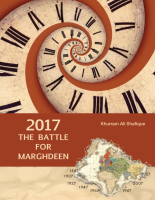 1) Go to the page for the book
1) Go to the page for the book
2) Scroll down the page and choose a format – epub, Kindle, PDF etc.
3) Apply this code: UH45Q
Enjoy!
Note: This offer expires at midnight, 18 August (California time).
August 8, 2012
The Battle for Marghdeen – Introduction
Anyone who has read Systems will know that its publisher, Libredux, is named after the ideal social system based on the Cohesive Ethics Theorem. When I used that name, I had no plans for it other than to publish the novel. But now, and quite unexpectedly, Libredux is taking on its second title, this time penned by the Marghdeen Learning Centre’s Khurram Ali Shafique.
At around the same time as I was formulating the theorem for the novel, Mr Shafique was formulating a theory of his own. His new book is inspired by a pattern he has found in the writings of Iqbal, which reveals a seven stage cycle for the development of a nation, or what Iqbal called the ‘collective ego’.
The book, titled: 2017: The Battle for Marghdeen, is due out on 14 August 2012 (coinciding with Pakistan’s 65th independence anniversary). I’m reproducing the Introduction below, to give you an idea of what it’s about. Further details will come later.
NB: Marghdeen is a fictional city on Mars, representing an ideal society as conceived by Iqbal.
——————————————————–
Introduction
Khurram Ali Shafique has one of those rare gifts of being able to find patterns in the most unexpected of places. His discovery of the ‘seven stages’ in Iqbal’s works, (having first seen the connection between Iqbal’s epic poem Javid Nama and his famous Reconstruction lectures) is most intriguing and has wider implications for the study of history with an essentially inductive method. This is not to suggest it is a tool of prediction, but it does provide a method for analysing the psychological direction in which a given society is moving as a ‘collective ego’.
Insofar as Mr. Shafique is looking specifically at Pakistan (and also Bangladesh), the most interesting part of the cycle can be seen at stage four – the ‘freedom’ stage. At first glance there seems to be an indication that Pakistan is not moving as we might predict in light of the cycle of stages. As Mr. Shafique shows, this is because this stage marks the point at which individuals or small sections of Pakistani society actively focused on individualistic goals instead of collective goals. Some commentators on the history of Pakistan have similarly concluded that there is a point of departure from the ‘Pakistan idea’ in the same period (1947-67) that Mr. Shafique has incidentally designated ‘freedom’. The main difference between most of these commentators and Mr. Shafique is that Mr. Shafique has illuminated the fundamental reason for the departure in clear terms. The Pakistan idea was the Muslims’ collective basis of partition in 1947, but the point of departure also becomes manifest soon after 1947. The implications for the later stages, especially the final one we have entered as of 2007 (‘creation’), are very interesting indeed, if not alarming, depending on how one interprets the data.
Yet Mr. Shafique has also shown that surface appearances rarely if ever represent the whole of reality. In fact the decision and actions taken by a collective ego or nation are based, in his words, ‘either on the real goal collectively adopted thirty years earlier, or its misinterpretation’ (emphasis mine). What this means is that the collective ego will always choose between one of two directions, or what the Quran calls the ‘two highways’; and this has obvious implications for that much misunderstood concept called the ‘Two Nation Theory’. Again, as Mr. Shafique puts it, whether or not Pakistan proves true to herself ‘will depend, eventually, on whether or not its people manage to make its history a success story. That in itself seems to be a daunting task just now, but this pattern might be a key to the solution’.
In other words, if the Pakistani nation can become consciously aware of its choices, it will be in a better position to make the right one and so succeed in the final phase. With this in mind, he has not only outlined the double nature of Pakistan’s path using some compelling evidence, but he has also supplied what he sees as the defining goal for the last phase, and the all-important turning point (2017) which will ultimately determine the outcome. Will Pakistan recognise her true nature? Will she transform into Marghdeen?
Whether or not Pakistan ultimately succeeds, her journey through the seven stages stands to offer invaluable information on the universal principles that motivate all nations in pursuit of a Higher goal.
And in any case, Mr. Shafique is optimistic, for he believes – based on what his theory truly implies – that there is no such thing as an evil age. Indeed he is, as Iqbal once described himself, ‘almost a fatalist in regard to the various forces that ultimately decide the destinies of nations’. This work thus represents an exciting new development not only for Iqbal and Pakistan studies, but for the field of history as well.
Saleena Karim, Nottingham, 28 July 2012
August 6, 2012
Interview at Michelle Gordon’s blog
Today I’m being interviewed at Michelle Gordon’s blog. Michelle’s interest is in all things spiritual, and she is author of The Earth Angel Training Academy. She is also a founding member of the upcoming Visionary Fiction Alliance.
This explains why the questions she asked me were little different from the norm. I was asked about my ‘spiritual’ beliefs rather than just about my writing. Since this kind of stuff is so very fascinating to me, I got on my soapbox at one point. Briefly. 
You can read the interview here. Do pop over and say hi.

